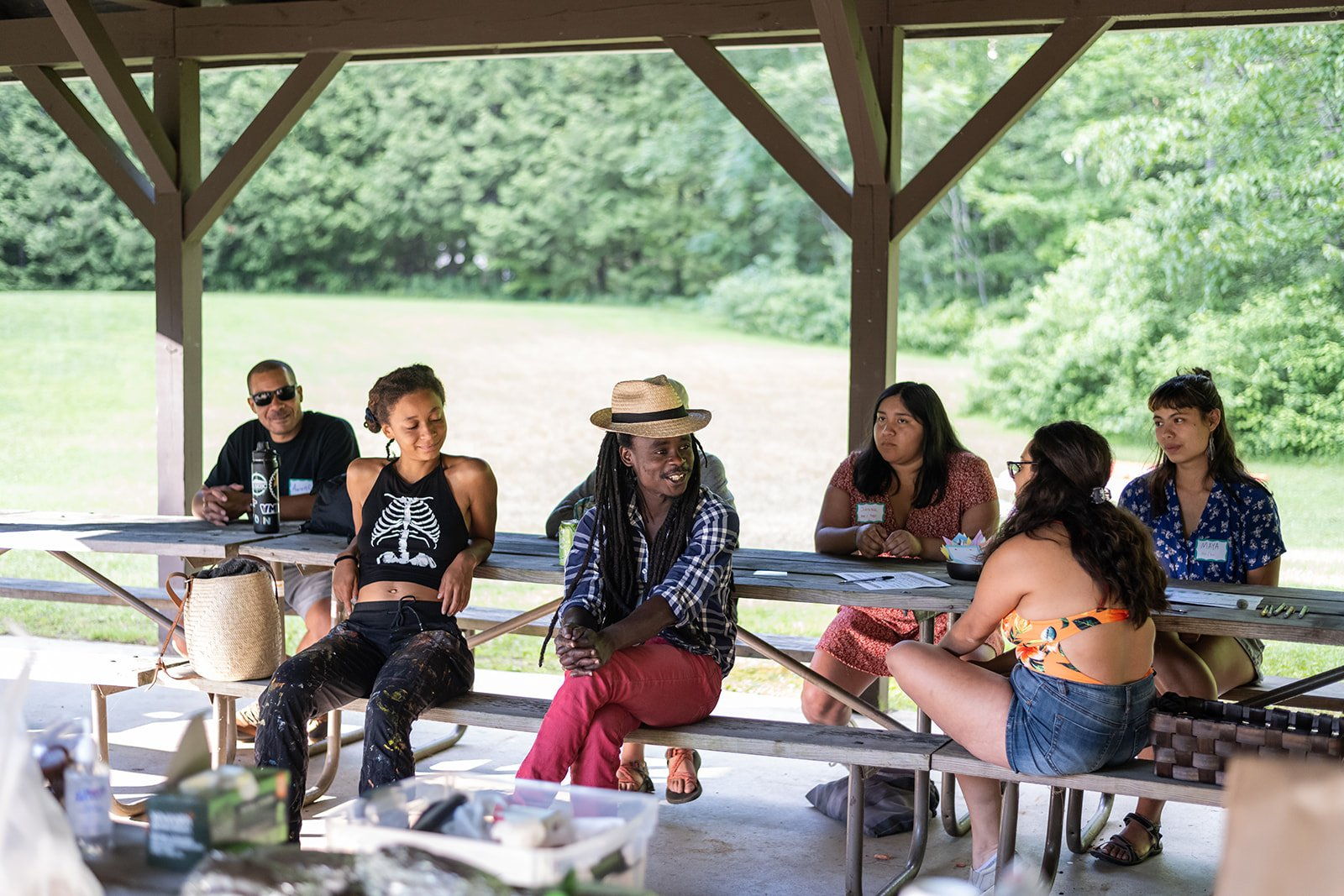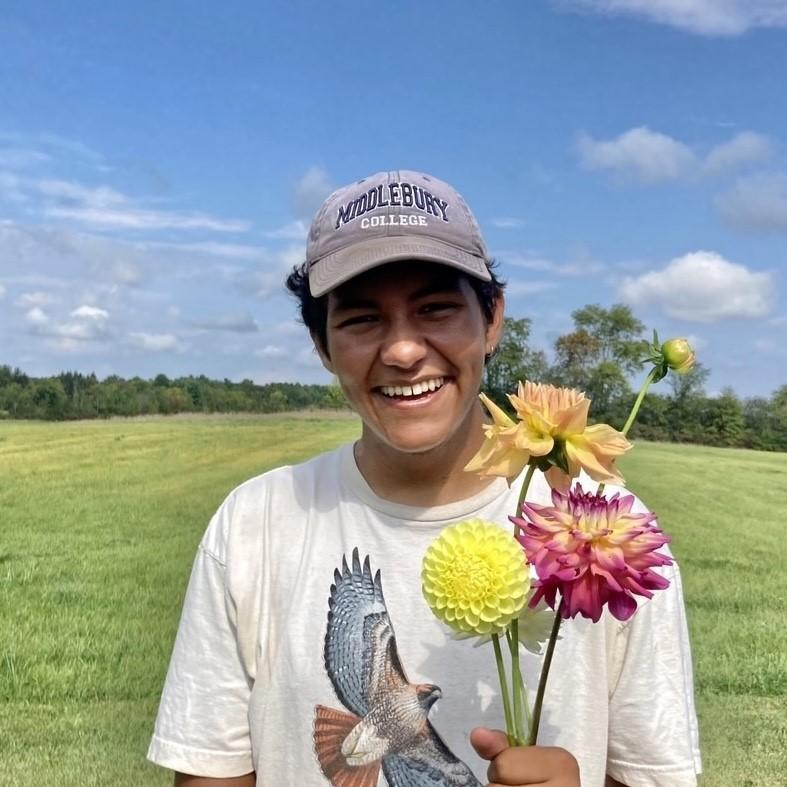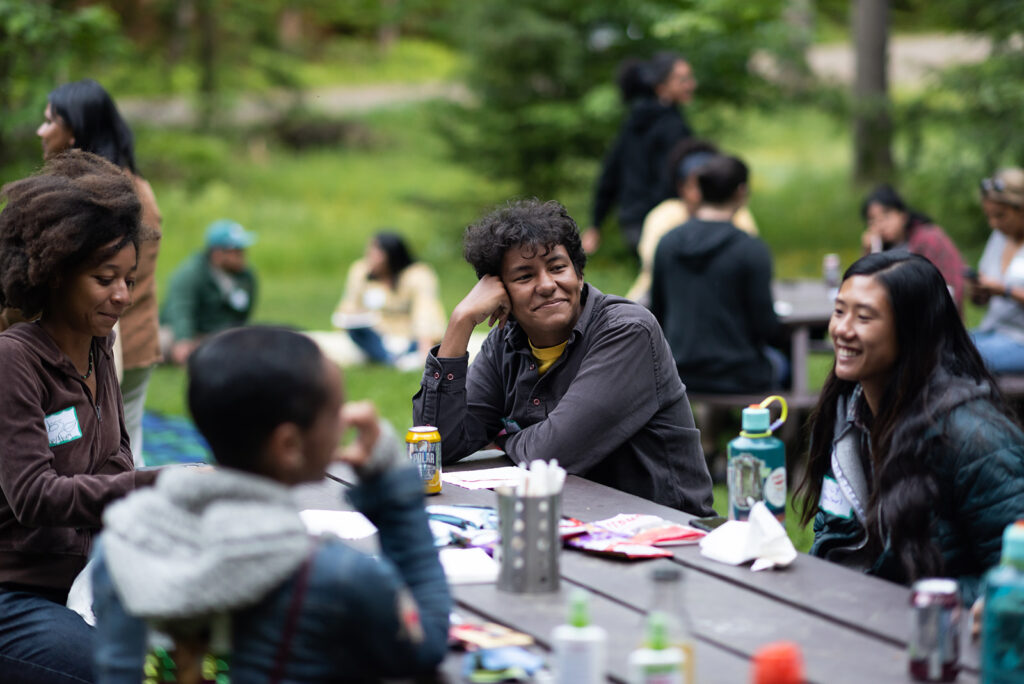
Isora Lithgow Creations

Isora Lithgow Creations
In early July of this year, much of Vermont was hit by heavy rain and subsequent flooding. The central parts of the state have suffered the “greatest concentration of damage,” according to the National Weather Service. Quite a few local daily and monthly rainfall records were broken, surpassing the highs that Hurricane Irene set in 2011. The only event that has caused more widespread damage was a Great Flood in November of 1927, before there was modern flood control in Vermont. Downtown Montpelier, where the state capitol is housed, was underwater, seeing 12.06 inches of rain in July, an all-time monthly record.

In the face of this destruction, loss, and suffering, what can people do? In much of Vermont, people found hope and resources in community organizing and mutual aid. I spoke with Andrés Oyaga about the importance of resilient BIPOC communities and change-making.
Along with being the Middlebury College Climate Action Coordinator in the Climate Action Program (CAP) and an agroecologist, Oyaga is also an organizer with the Vermont Releaf Collective, which “cultivates connection, shares resources, and amplifies the voices of people of color in Vermont within [their] focus areas of Land, Environment, Agriculture, and Foodways. Releaf is a “collaborative ecosystem for growing power and community for [their] members.” Some of the wisdom Andrés shared is below, edited for length and clarity:
KYM: Could you share some of how you came to be where you are?
AO: My mom, when I was growing up, was a house cleaner and my dad was a cook. Both of them were in these regular jobs but both of them are very strong people, very strong willed people. And so they ended up both doing a lot of organizing in their workplaces. My mom helped start a day laborers union and my dad is like a union man. He’s very involved in the union at the place that he works. So both of them were very organizer-oriented people–they understood the importance of accountability and checking power and not ever feeling small. And I think both of them instilled that sense of responsibility in me and my brother and I’ve always been trying to give people a sense of power in community. That’s how I characterize and categorize my work.
I worked with Vermont Releaf a lot, which is something that I started doing in 2021 when they first got founded. I was going to meetings and hanging out with them, but that was a really strong sense of community. Releaf has been growing since July 2020 and decided to open these organizer positions. At the time, I was working at the Knoll [Middlebury College student run organic farm] and farming there and bringing BIPOC folks out to farm together and was really interested in the Foodways Organizer position. It’s been really rewarding because what I get to do right now is just build community.
I remember going to my first Releaf gathering in the summer of 2021. I was feeling a little homesick and it was also a very sensitive time. I think people were really overcompensating for like, decades of not talking about race or racism, and it was a little overwhelming because everyone wanted to talk about race and racism all the time. And they would often turn to the few people of color in the room to ask them to do the labor so it was nice to go to a space where that was why we were there–we were there to organize around racial equity but it wasn’t laborious. So I felt a sense of home and I’ve been trying to find a sense of that community since and I joined in order to create those kinds of spaces for other people. It’s really sweet and special that we’re creating an intentional community together.
There’s a vulnerability that people come with. I think we all start from a place of deep trust with one another because Releaf has this sense of solidarity with all of the people, all the members in it. When people show up to these community-organized conversations, I feel like a weight comes off all of our shoulders and we’re willing to commit to be open. I think because of the affinity space in such a white state like Vermont, people show up needing that–willing to be a bit more vulnerable, willing to make those kinds of safe connections with people.

KYM: How do you think Releaf impacts individuals’ lives? And how does that in turn impact a more local community?
AO: I see Releaf really like an incubator. It’s a good place where people go to get recharged, network, have ideas, share ideas with each other, and then go back to their hometowns and have this more sense of self. I think coming into Vermont and maybe you’re the only person of color in your workplace or you’re the only person of color in your community–you can just be on edge sometimes. So having a community where you can recharge, I think that gives us more confidence–it gave me more confidence.
There’s this bigger community that’s holding me and so, in a way, I feel like I’m not learning the skills of how to be an organizer, but I’m having the friendships and the networks and gaining the sense of courage from these community members. I’ve learned a lot from Releaf members, like a lot of the people in Releaf are community organizers, either as their job title or informally. I feel like it’s a really important place for people to just put their heads together and talk ideas out and so many cool things have come out of Releaf and gone down their own little path.
Community dinners and conversations really just hold people. One of the greatest things about Releaf is that we don’t claim ownership over anything, we really just love to facilitate spaces where people can do their own thing. But there’s someone to pay for the food, get a venue, really hold and organize these kinds of spaces. I think our biggest contribution to the BIPOC organizing scene in Vermont is holding space for people.
KYM: How does this community influence people’s responses when impactful events, like the floods, happen?
AO: When the floods happened, the listserv that we have was going off. Some people were sending updates like, “Hi, I live in Barre, and I’m okay.” Which is great. There’s other people who were like, “My culvert is out, does anyone have recommendations?” And there’s also people who were just offering. There’s one person who was offering somatic therapy–come and dance and help calm your body in these flood moments. There’s people sharing information about like what Small Business Association loans are available and here are some grants from NOFA [Northeast Organic Farming Association of Vermont]. And then there are people who are like, “Can people come and help me?” And people were showing up to help them out.
I think it’s important because it’s such a place that you can just call into the void and ask for help and someone will always echo back, someone will always respond. That’s why it’s important to have that for BIPOC folks because oftentimes in a community space, there’s a lot of microaggressions and racism that can affect a community. Having an affinity space where BIPOC folks can feel like they can rely on other BIPOC folks to support them in a moment is kinda great. And there’s also a sense of solidarity that we have to help one another in a state like Vermont. That’s why the listserv and Releaf are an important model. I don’t think they necessarily exist in other places in the country, maybe because there isn’t the same need, but in Vermont, I think BIPOC folks feel really isolated. Releaf is important because especially during the flooding, we were there and we held space again and people were emailing and trying to coordinate help. What Releaf does really well is that we are all BIPOC folks, that is what brings us together. And yet, we have so much difference. There’s so much diversity within our community. Rather than siloing ourselves, we’re trying to create a safer space.